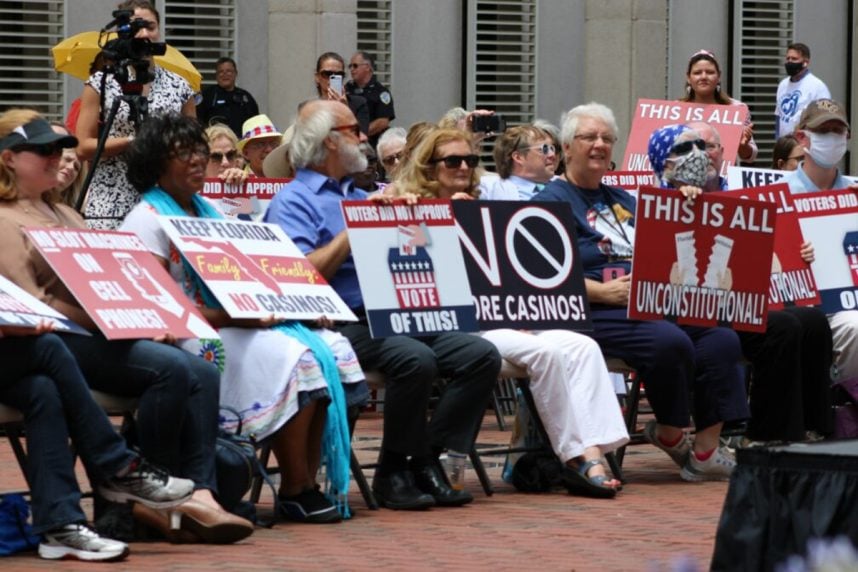Published: October 17, 2023, 02:33h.
Last updated: October 17, 2023, 02:33h.
The Florida sports betting deal with the Seminole tribe faces opposition from a group behind a constitutional amendment to limit gambling. This group argues that the agreement violates the will of Florida voters.

No Casinos, Inc., a long-time opponent of gambling expansion, has filed a brief in the Florida Supreme Court. They aim to invalidate the tribal gaming compact that grants the Seminole tribe a monopoly on mobile and retail sportsbooks in Florida.
In 2018, No Casinos led a successful campaign to add a constitutional amendment that bans the expansion of casino gambling without explicit approval from voters. However, three years later, Governor Ron DeSantis signed a gaming compact with the Seminole Tribe, allowing them to expand their casino offerings and offer sports betting. The agreement would have permitted the tribe to accept online bets as long as the sportsbook servers were situated on tribal land.
No Casinos argued in its amicus brief that the gaming compact violates the spirit and public policy behind the constitutional amendment. They are supporting opponents who are asking the Florida Supreme Court to invalidate the compact and associated laws enacted by the state legislature.
No Casinos’ intervention is the latest development in a ongoing fight that has prevented Florida from having a legal sports betting system.
Multiple Legal Challenges
Opponents, led by pari-mutuel operators West Flagler Associates, have been fighting the gaming compact in federal court. They argue that allowing online betting violates the Indian Gaming Regulatory Act’s prohibition of off-reservation gaming.
Last week, the US Supreme Court blocked the compact from taking effect while considering opponents’ request to review the case.
Chief Justice John Roberts issued a stay on a previous ruling from the US Court of Appeals for the Washington, DC, Circuit, which had declined to rehear the case.
Florida has been without legal sports betting since November 2021 when a federal court initially blocked the gaming compact.
In its state court brief, No Casinos highlighted that federal courts have avoided addressing the question of whether the “hub and spoke” model outlined in the compact is suitable under state law.
No Casinos wrote, “Thus, the court explicitly left it to this State’s courts to say what Florida law means, and how that affects the Compact.”
No Casinos argues that it is within the authority of the state supreme court to declare that the governor and legislature cannot authorize off-reservation gaming as allowed by the compact.
No Casinos stated, “The Compact and statutes that perpetuate and endorse the notion that ‘Indian lands’ exist wherever a mobile phone with a gambling app exists is a blatant attempt to legislate in an area that is, in fact, outside the authority of the Governor or the Legislature.”
Tribe’s Position in SCOTUS Case
The Seminole Tribe has informed the US Supreme Court that it does not plan to file a response in the case. The lawsuit filed by West Flagler Associates targets the Department of Interior, which oversees tribal gaming, and seeks to invalidate the Interior Secretary’s implicit approval of the Florida compact.
In a letter to the court, the tribe’s lawyers explained their previous attempts to intervene based on sovereign immunity and the D.C. Circuit’s denial of those attempts, upholding the compact.
The letter read, “For these reasons, the Tribe does not intend to file a response to the stay application. However, the Tribe would gladly file a response should the Court desire one from the Tribe.”


